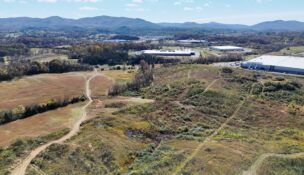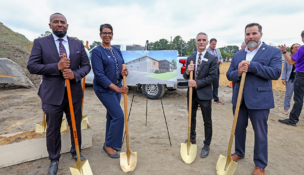
In February, CoStar Group announced it would move its corporate headquarters from Washington, D.C., to Arlington’s Central Place Tower, which it acquired for $339 million. Photo courtesy CoStar Group

In February, CoStar Group announced it would move its corporate headquarters from Washington, D.C., to Arlington’s Central Place Tower, which it acquired for $339 million. Photo courtesy CoStar Group
Virginia is for HQs
Commonwealth attracts major companies
When CoStar Group was searching for its new headquarters in 2022, Central Place Tower at 1201 Wilson Blvd. in Arlington County, with its impressive accompanying bird’s-eye views, captured the company’s attention.
Located about a quarter mile from the Potomac River, the gleaming, 391-foot-tall Class A office building features floor-to-ceiling windows across its 31 stories, reflecting the sky, all topped off by a 12,000-square-foot observation deck providing a panoramic view of the area and D.C. landmarks like the Washington Monument. The deck’s three stories of windows and a terrace looked like it would make an ideal meeting place for a company flying in clients from places like Los Angeles, London and Singapore.
Outside the 560,000-square-foot building, a 16,000-square-foot outdoor plaza provides a place to take a break or eat lunch, and across the street stands the Rosslyn Metro station, where passengers can catch a train to either of the region’s two major airports.
“What really appealed to us was the opportunity to have a significant presence up in Rosslyn on a transportation hub … and something that’s a real iconic building [where] we could gather folks coming from around the world for meetings and the like,” explains CoStar founder and CEO Andy Florance.
CoStar, a global real estate data and analytics company best known for its Apartments.com and Homes.com brands, first contacted the Virginia Economic Development Partnership about potentially relocating its corporate headquarters to Virginia from Washington, D.C., in September 2022. During CoStar’s assessment of more than 25 sites in D.C., Arlington and Fairfax County, the company narrowed in on Central Place Tower.
But the building came with a challenge for CoStar: The observation deck, then called The View of DC, came with a county easement that kept it open to the public as a tourist attraction and events space. The View of DC recorded 32,188 visits in 2023, of which about 27,000 were from non-Arlington residents.
“For us,” Florance says, “when we’re trying to bring people in from around the world and having these meetings and partner meetings and staff and client training, having a special space to gather people was important, and having public access and secure, confidential meetings would be difficult or not feasible.”
That’s when Arlington rolled up their sleeves. To address the easement question, explains Arlington Economic Development Director Ryan Touhill, his team worked with the county’s planners, attorney’s office and board “to determine, ‘Could we unwind that?’ and that way, that could give CoStar full access to this prime, trophy office building, and then [the county could] use the funding that we would get from that to reinvest in the neighborhood.”
In February, CoStar announced it would relocate its corporate headquarters to Central Place Tower, purchasing the building for a reported $339 million with plans to invest $20 million in the move. The company is formulating its renovation plans for the building, including lobby and security improvements.
Some CoStar employees are already working at Central Place Tower, and the company plans to have “a significant percentage of [its] team in the Washington metropolitan area” based there by May 2025, Florance says, with all corporate headquarters staff moving to the building by the end of 2025.
CoStar reached a deal to obtain sole use of the observation deck, paying Arlington County $13.95 million, funding the county manager proposed to be used toward the planned redevelopment of the nearby 3-acre Gateway Park, home to the annual Rosslyn Jazz Festival.
In July, the Arlington County Board approved a site plan amendment and a zoning ordinance amendment allowing CoStar private use of the observation deck and allocated the funds for the park’s redevelopment.

“This actually helped accelerate the redevelopment of that park space by nearly a decade, and so now we’ll have a truly world-class amenity in the heart of Rosslyn that will benefit those folks that come to work there every day,” Touhill says. “It’ll benefit the residents and any visitors that we bring to the park.”
Arlington’s negotiations with CoStar to reach an agreement on the observation deck is one example of the flexibility Virginia state and local officials demonstrate when attracting and retaining large economic development projects, including multiple major corporate headquarters relocations.
Lay of the land
Twenty-four Fortune 500 companies are headquartered in Virginia, not counting Amazon.com, which officially opened its East Coast headquarters, HQ2, in Arlington’s National Landing area in June 2023. Additionally, since 2020, huge companies like ASGN, Boeing, RTX and CoStar have announced headquarters moves to Virginia.
Winning Amazon’s HQ2 in 2018 was a coup for Virginia, which triumphed over nearly 240 competing bids from other cities and states.
HQ2 was “a real catalyst in some ways,” says VEDP President and CEO Jason El Koubi. “I think it sent a signal to the rest of the world that Virginia is America’s East Coast tech hub, that Virginia is sort of America’s corporate hometown, a place where you have a real density of corporate headquarters that are thriving.”
Along with state and local officials’ willingness to negotiate, Virginia has attracted corporations like Amazon because of its business-friendly environment, educated workforce, location and track record.
Although the state’s recent headquarters wins have garnered big headlines, it’s not a new phenomenon. In past decades, Virginia has been the corporate base for companies like ExxonMobil, AOL, Circuit City and A.H. Robins Co. And it’s currently home to international defense contracting giants like Northrop Grumman and General Dynamics.
The commonwealth historically has had success attracting major headquarters, says Todd Haymore, managing director of Hunton Andrew Kurth’s global economic development, commerce and government relations consultancy and a former Virginia secretary of commerce and trade.
“Look at the broad scope of time,” Haymore says. “It’s not just happening in the last couple of years; it’s happened across decades, and I think it’s fostered by the fact that we are recognized as that pro-business, pro-growth, pro-job creation state.”
For instance, Virginia is a right-to-work state, meaning employees cannot be required to join a union as a condition of employment.
Factors such as these, along with the state’s strong foundation in higher education and workforce training, have contributed to Virginia’s record six wins as CNBC’s Top State for Business in the cable business news network’s annual rankings for 2024, 2021, 2019, 2011, 2009 and 2007.
Also aiding the state’s business-friendly reputation is its stable regulatory environment.
“Companies generally look at Virginia and say, ‘OK, doesn’t matter who’s in the governor’s mansion, doesn’t matter who’s controlling the General Assembly, it’s still going to be pro-business.’ That means a lot,” Haymore says.
CoStar worked with local and state officials, including multiple gubernatorial administrations, on bringing its campuses to Virginia and expanding its footprint in Richmond.
“Virginia generally is very supportive in their economic development efforts to help make it easy for companies like ours to make the sort of massive investments necessary to move your location into the state. They’ve been very supportive. They have gone the extra mile,” Florance says.
The state’s fiscally responsible as well, El Koubi points out. In November 2023, Fitch Ratings affirmed the Virginia government’s AAA long-term issuer default rating, the highest rating Fitch issues. In September, S&P Global Ratings affirmed the commonwealth’s AAA long-term rating on its general obligation debt outstanding, though its appropriation-backed debt received an AA+ rating. Virginia first received an AAA rating from S&P Global in 1962.
Additionally, the commonwealth has maintained a corporate income tax rate of 6% since 1972. “From a tax and regulatory standpoint, Virginia is a very reasonable, predictable, stable operating environment for businesses,” El Koubi says.
That steady corporate tax rate can reduce costs for businesses relocating from other states, providing a competitive advantage for Virginia. For example, neighbors Maryland and Washington, D.C., have an 8.25% corporate income tax rate.

Sweetening the pot
Along with Fairfax County’s location, a factor in Hilton’s decision to relocate its headquarters there in 2009 from Beverly Hills, California, was that the move would significantly reduce operating costs, according to the Fortune 500 global hotelier.
“Northern Virginia places Hilton strategically in a central location near our nation’s capital, where we’ve had the benefit of operating in a stable business climate and have simultaneously reduced our operating costs,” Hilton’s senior vice president and global head of talent, Christine Maginnis, said in a statement to Virginia Business.
Similarly, while not always related to company costs, incentive packages offered by Virginia and its localities also help secure large economic development projects like headquarters relocations and major corporate campuses.
For example, CoStar’s Richmond campus, which predates its headquarters move to Arlington by nearly a decade, demonstrates the state’s success in tailoring benefits for companies.
In 2016, CoStar announced it would build a research and technology center in Richmond. Five years later, the company announced a $460.5 million expansion of its Richmond presence into its Corporate Innovation Campus, housing sales, marketing, software development and various other functions. CoStar expects to create 1,984 jobs and have 1 million square feet of office space in the expanded riverfront campus, which is expected to be completed in 2026.
As part of the benefit package for CoStar’s Richmond expansion, the state legislature approved a $15 million grant fund reimbursing the company for public infrastructure improvements, including commuter access and parking and pedestrian access. If, however, CoStar does not reach at least 90% of its pledged job creation and capital investment by Dec. 31, 2028, the company will have to repay an amount proportional to any missed targets.
For CoStar’s Arlington headquarters relocation, Gov. Glenn Youngkin approved $3.5 million for a Virginia Economic Development Incentive Grant (a performance-based cash grant), and a $1.25 million grant for Arlington County from the Commonwealth’s Opportunity Fund, a cash grant awarded to local governments on behalf of a company to offset or reimburse certain project-related costs.
Nevertheless, economic incentives are generally just one of several factors that companies consider when locating headquarters or other major assets in Virginia, not the deciding factor.
For instance, when Boeing announced it would relocate its headquarters from Chicago to Arlington in May 2022, the Fortune 100 aerospace and defense contractor did not receive discretionary state incentives. Nor did Fortune 100 defense contractor RTX, at the time branded as Raytheon Technologies, which announced in June 2022 that it would move its headquarters from Massachusetts to Arlington.
Planning ahead
Access to an educated labor force is another important component of a company’s considerations when locating a headquarters, and another place where Virginia is strong.
“I would say that one of the key things that attracted us to Virginia is the higher education system — Virginia Tech, VCU, James Madison, just a whole range of great educational institutions [that] gave us the confidence that we would have the workforce we’d need,” says CoStar’s Florance.

In U.S. News & World Report’s education rankings for states, Virginia ranks No. 10 in education overall, No. 9 in pre-K-12 education and No. 20 for higher education.
In Arlington, 78% of the county population holds a bachelor’s or higher degree, according to the 2023 U.S. Census Bureau American Community Survey one-year estimate.
Additionally, Virginia is ripe to target businesses seeking tech talent. Part of the state’s successful bid to land Amazon HQ2, Virginia’s Tech Talent Investment Program aims to produce 31,000 in-demand computer science and related graduates in the next two decades. The program is 2 1/2 years ahead of schedule, according to El Koubi.
It also showed Virginia’s commitment to a long-term strategy, says Chris Lloyd, director of infrastructure and economic development with McGuireWoods Consulting: “I think that that showed that Virginia wasn’t just in it for the short term, but that we were going to build this 20-year pipeline of tech talent and obviously everything else associated with that. … Instead of thinking short term, we thought long term, and leading companies are recognizing that.”
The tech talent program has fueled large state investments in higher education infrastructure, such as Virginia Tech’s $1 billion Innovation Campus in Alexandria, which enrolled its first class in 2020 in temporary space. The campus’ first academic building is set to open in spring 2025. Meanwhile, George Mason University is building its $178 million Fuse at Mason Square, which will have 345,000 square feet for research and development labs, corporate innovation centers and related facilities.
“Almost every business operation now is in part sort of a tech operation, where, corporate headquarters included, … they need tech talent as part of their overall talent needs, and so we’re really doubling down on that and investing in our talent pipeline and solidifying that as one of Virginia’s differentiators,” El Koubi says.
When ASGN moved its headquarters from Calabasas, California, to Henrico County, announcing in 2020 that it would invest $12.4 million on the move, the decision was partly because the Fortune 1000 IT company already had a major subsidiary, Apex Systems, headquartered in Henrico, but ASGN President and CEO Ted Hanson also cited the state’s talent pipeline.
“Virginia’s strong pipeline of information technology talent for both the commercial and government sectors make it an ideal place for us to have our headquarters and continue to grow,” Hanson said in a statement at the time.
Boeing was also attracted to Virginia in part because of its talent pool, according to a statement then-CEO Dave Calhoun made during its announced relocation from Chicago: “The region makes strategic sense for our global headquarters given its proximity to our customers and stakeholders, and its access to world-class engineering and technical talent.”
Boeing had previously made a $50 million, multiyear commitment to Virginia Tech’s Innovation Campus.

Location, location, location
Outside of tech talent, corporate headquarters need a large professional services core, and the Northern Virginia and Richmond regions offer that, says Lloyd. If you’re going to be establishing a headquarters, he says, “you need to have large law firms and large accounting firms and large ad firms and all the cluster around you.”
Virginia’s central Eastern Seaboard location gives it another boost in headquarters location decisions. “Virginia offers corporate headquarters companies proximity to key economic hubs around the East Coast [and] critical consumer markets,” El Koubi says.
Plus, Northern Virginia features two major airports, with Washington Dulles International Airport offering nonstop flights to 59 international destinations. And the statewide Port of Virginia system, which processed 3.5 million 20-foot equivalent units in fiscal 2024, provides convenient shipping and rail access.
“In Northern Virginia, the airports are a critical factor for a global company [that has] people coming in from around the country and around the world,” says Florance. The headquarters building in Rosslyn was particularly appealing because of its location on the Metro line between Ronald Reagan Washington National Airport and the Dulles airport, he says.
RTX’s 2022 announcement of its headquarters move to Arlington cited the Washington, D.C., region “as a convenient travel hub for the company’s global customers and employees.” And in 2009, Hilton President and CEO Christopher Nassetta touted the commonwealth’s “central location from which to operate a global organization.”
Additionally, Northern Virginia’s proximity to the nation’s capital and the Pentagon makes the region attractive for headquarters, particularly for federal contractors.
“It’s appealing to be headquartered in the D.C. area, not just from a talent access perspective or business climate perspective in Virginia, but because [companies] have close proximity to the federal government from a lobbying and government affairs standpoint,” says Michael Hartnett, JLL’s research lead for the mid-Atlantic region.
Virginia’s competitive advantages for landing corporate headquarters also have grown through the wealth of companies that have previously relocated to the commonwealth.
“Part of what makes Virginia a very business-friendly state and a very strong ecosystem for headquarters,” El Koubi explains, “is the fact that you have a very high density of corporate headquarters in Virginia. … These headquarters companies like to cluster to some extent, in part because of the talent but also because of some of the things that a corporate headquarters needs, including connectivity to the rest of the country and the rest of the world.”
On the local level, Arlington also is profiting from its record of attracting companies like Amazon, Boeing, RTX and CoStar.
“When these companies select us,” Touhill says, “it’s a vote of confidence in Arlington and Virginia’s business environment, and like-minded companies take note of that.”
t

















